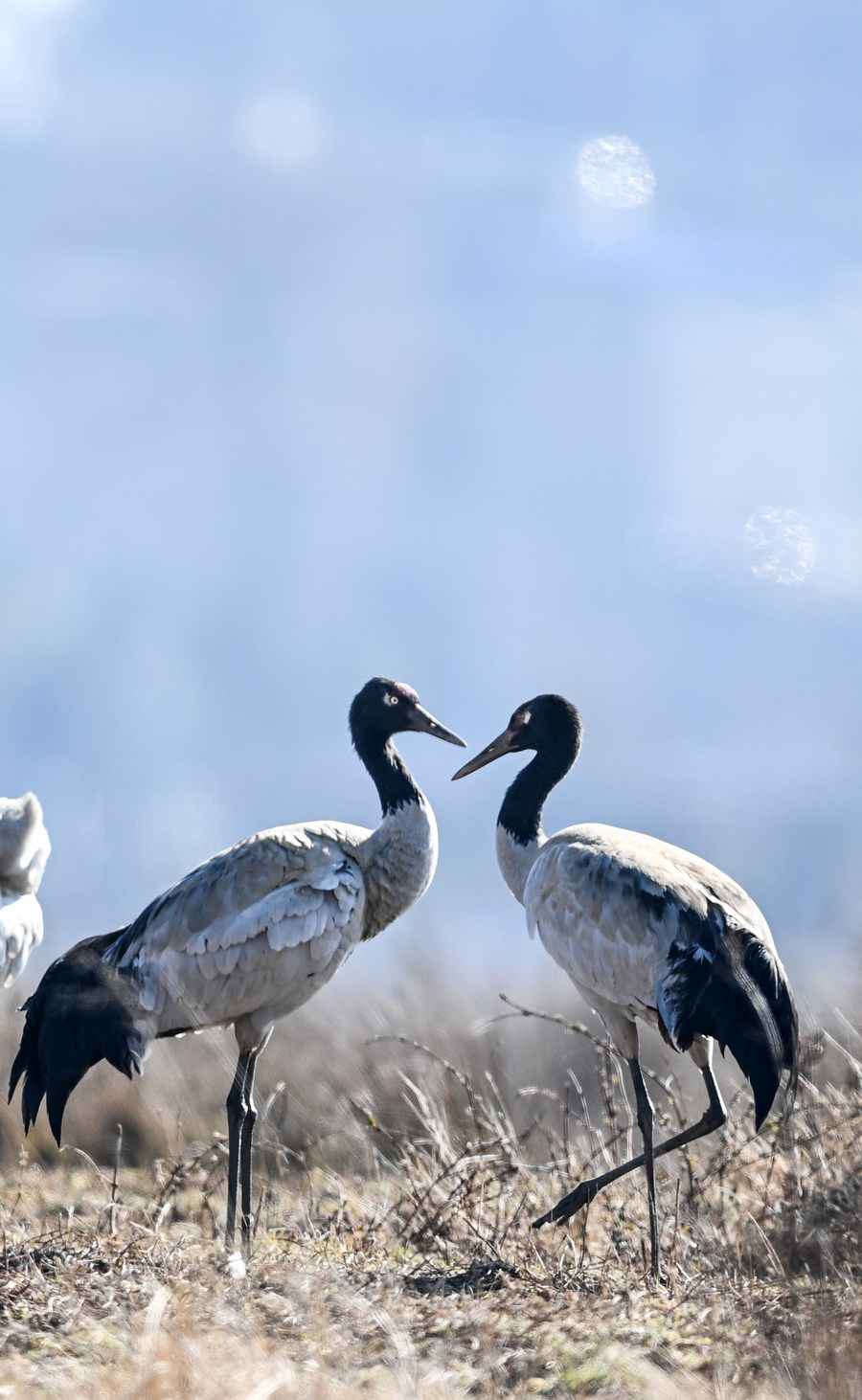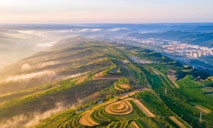Patroller takes rare birds under wing in southwest China

Rangers scatter food for birds at the Caohai National Nature Reserve in the Yi, Hui and Miao Autonomous County of Weining, southwest China's Guizhou Province, Feb. 2, 2021. (Xinhua/Yang Wenbin)
GUIYANG, July 18 (Xinhua) -- At 7 a.m., Liu Guanghui puts on a vest printed with the words "Caohai Patrol," takes on his camera, and begins a new day of work.
Liu, 52, is the vice-captain of the team patrolling Caohai Lake, a major wetland area in the Yi, Hui and Miao Autonomous County of Weining, southwest China's Guizhou Province. It is one of the largest wintering locations for black-necked cranes, a rare bird species.
Liu has been patrolling the area for decades. Years of hard work left his skin dark and rubicund.
More than 50 years ago, locals reclaimed land from the lake to grow crops because of extreme poverty, causing the lake to shrink to five square km. In 1975, only 35 black-necked cranes flew to the area to get through the winter.
To reverse this situation, in 1985, the provincial government listed Caohai as a provincial-level protection zone. In the same year, the patrol team was established, and four years later, Liu applied to become a patrolman.
Now, more than 30 years later, the ecosystem in the area has completely changed for the better. According to the latest figures, the types of birds there have increased to 246, including over a dozen of new bird species in Guizhou.
FROM "BIRDMAN" TO SELF-TAUGHT CAMERAMAN
Born and raised near Caohai, Liu used to shoot birds with slingshots or catch them when he was a kid. He faced strong objections from his father.
"My dad stopped me from hurting the birds, and told me that the birds had to raise their babies," Liu said. He took to heart his father's words and started protecting the birds.
In the beginning, the patrol team had fewer than 10 people. Due to a lack of hands, Liu and his colleagues faced great pressure.
"At that time, the villagers did not have a strong awareness of bird protection, and they often hunted birds day and night," he recalled.
One of Liu's neighbors was a skilled bird hunter and often went to the lake to catch birds to cook. Liu went to his home to dissuade him from doing so. They had a conflict and did not speak for nearly half a year.
Despite only three years of primary school education, he taught himself knowledge about birds. He even learned to distinguish the species of birds by simply listening to their twittering. His colleagues gave him a nickname: Mr. Birdman.

Photo taken on Feb. 3, 2021 shows black-necked cranes at the Caohai National Nature Reserve in the Yi, Hui and Miao Autonomous County of Weining, southwest China's Guizhou Province. (Xinhua/Yang Wenbin)
But what makes Liu most proud is the tens of thousands of photos he took of various birds in the past years.
"In 2004, I saw a photo of a bird taken by a photographer. It was quite beautiful," Liu said. Later, he came up with the idea of buying a camera to take photos of birds himself.
At that time, Liu's monthly salary was only about 300 yuan (about 46 U.S. dollars). He saved nearly 20 months of salary and asked his wife for another 2,000 yuan. Finally, Liu raised enough money and bought his first camera in 2008.
Liu's wife, Su Mei, was once angry about this and did not talk to him for about one month. In her opinion, what Liu did could do nothing but increase the financial burden on the family. But after seeing the fine photos Liu took and the smile on his face, she gradually understood him.
Liu's main subjects were wintering birds such as the black-necked cranes. But the cranes are quite vigilant and would fly away whenever people come near. Liu would crawl on the grass when he began taking pictures. He would lie still if the cranes noticed him. Once the birds resumed foraging, he started moving closer.
Liu gradually became the birds' acquaintance.
"They all know me," he said, adding that when he is alone, he can take photos within about 10 meters of the birds. But if he comes with strangers, he can only take pictures from more than 30 meters away.
Liu has discovered more than 10 species of rare birds over the past years, such as the Oriental white stork, the purple waterfowl, and the black eagle.
He has become a well-known bird photographer in the local area, and whenever non-local photographers come to take pictures, they would ask him for suitable locations of photography. Many of Liu's photos have been published in the Guizhou Handbook of National Key Wildlife Protection.
In recent years, the Chinese government has stepped up efforts to curb environmental pollution and increased protection funds. The wetland ecosystem in Caohai has been fully restored, with increasing biodiversity and less environmental pollution.
"As long as the environment of Caohai gets better and the living environment of birds becomes more comfortable, what we do will be worthwhile," Liu said. "All of our efforts are for the better protection of birds in the lake."
Photos
Related Stories
Copyright © 2021 People's Daily Online. All Rights Reserved.










